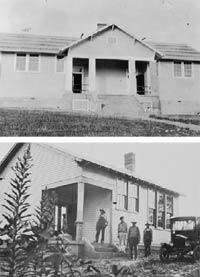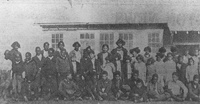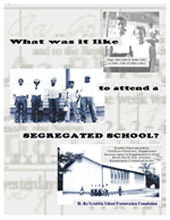African-American Education in Rappahannock: We Can If We Think We Can
 The communities in Amissville (top),Flint
Hill (bottom),
and Washington (not pictured) also built
Rosenwald Schools. Courtesy of the Library of Virginia
The communities in Amissville (top),Flint
Hill (bottom),
and Washington (not pictured) also built
Rosenwald Schools. Courtesy of the Library of Virginia Scrabble students in 1924.>
Scrabble students in 1924.> Catherine Dennis's graduation cards (1948)
Catherine Dennis's graduation cards (1948)It wasn’t merely a phrase.
The Scrabble School motto expressed the determination of the Rappahannock County African-American community to provide their children with a good education.
They were up against a prevailing view in America—especially in Southern communities—that African Americans should not be educated at all. If they were to go to school, they should receive only vocational training to prepare them for low-skilled, low-wage jobs.
Such discrimination and low expectations were reflected in the resources African-American schools received. In Rappahannock County, African-American school classes were larger, supplies scarce, and just about everything was hand-me-downs from the white schools. The U.S. history book Scrabble students used in 1948, for example, was published several years before the end of World War II in 1945!
Many African Americans worked to better their lives in spite of the prejudice and obstacles they faced. Fortunately for the children who attended Scrabble School, their teachers belonged to this group. Carol A. Williams, for example, taught generations of children to believe in themselves. She and other Scrabble teachers held very high academic standards, instilling in their students a positive attitude and confidence befitting the school motto. Alumni speak with great fondness and appreciation for the teachers who inspired many of them to pursue careers as doctors, ministers, teachers, and military officers. By the time they graduated from Scrabble, they had every reason to believe they could do anything.
Audio Recordings
-
Also replaced.
-
Also replaced.
-
Also replaced.
